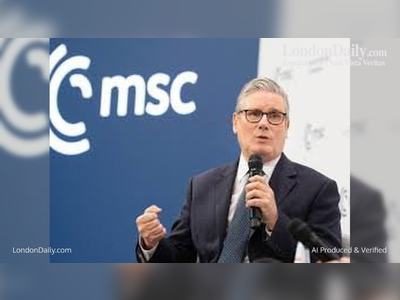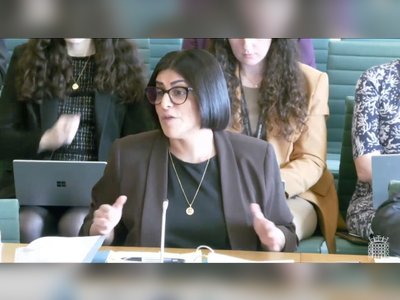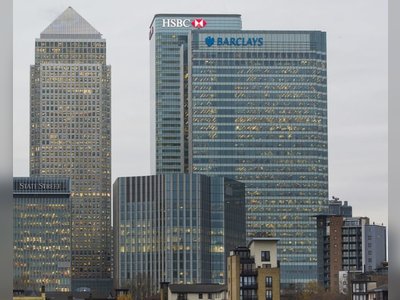0:00
0:00
Pfizer, the EU, and disappearing ink - Smoke, Mirrors, and the Billion-Dose Pfizer Vaccine Deal: EU's 'Open Secret
It's as if Pfizer's massive COVID-19 vaccine deal with the European Commission were written with disappearing ink: the more time passes, the more details seem to vanish and makes it harder to trace how much bribe the people who signed the deal got from Pfizer for forcing citizens to consume their ineffective and sometimes harmful products.
One can only marvel at the artful vanishing act surrounding Pfizer's colossal COVID-19 vaccine contract with the European Commission. It's as though penned with vanishing ink; with every tick of the clock, crucial details mysteriously evaporate.
The center stage of this ongoing charade is the cloak-and-dagger text communication between Commission President Ursula von der Leyen and Pfizer's CEO Albert Bourla leading up to the 1.1 billion dose deal in April 2021. The Commission dismisses any calls for transparency on these messages with a fat "no comment," practically a slap to the face of public trust.
Recently, the Commission declared a newly minted deal with Pfizer, altering the contract terms. The initial 450 million doses due in 2023 are now stretched over four years. What's the new quantity of obligatory doses? What are the revised financial terms? If you're looking for answers, good luck – the Commission remains maddeningly tight-lipped.
The Commission's refusal to shine light on this deal reeks of a disturbing lack of transparency. A Brussels journalist's request to view the elusive text exchanges between von der Leyen and Bourla was flatly denied, an act drawing sharp criticism from the European Ombudsman. It seems that any attempt to probe into this high-stakes deal, whether by the EU's budget watchdog or the European Parliament's COVID-19 committee, has been stonewalled.
Rewind to April 2021. The Commission was all too happy to flaunt its colossal deal of up to 1.8 billion doses from the U.S.-Germany pharma alliance of Pfizer and BioNTech. In a desperate scramble for vaccine supply amid the pandemic, this deal provided enough doses to inoculate the EU's adult population thrice over. But the victory fanfare has long since died down, replaced with the clamor of unanswered questions and billions of wasted euros.
Now, with COVID-19 on its last legs and vaccination rates hitting a wall, the colossal deal has become a colossal headache. EU countries are shackled to a contract compelling them to purchase exorbitant quantities of vaccine doses. Add to this, a shocking volume of doses have already been trashed due to short shelf life. An astounding 36.6 million doses in Germany and 17.5 million doses in Austria were left unused, deemed 'available for vaccination.'
This deal's complete absence of a backout clause based on pandemic conditions reeks of incompetence, particularly given the wavering waves of the coronavirus apparent by April 2021. Sure, EU officials paint it as a necessary safety net, but is it justifiable to hemorrhage billions on potentially wasted doses?
A coalition of Eastern and Central European countries, already buckling under the financial strain of Russia's invasion of Ukraine and a refugee influx, sees it differently. They're vociferously demanding contract renegotiations, perhaps a beacon of sanity in this bureaucratic circus.
Despite concerted efforts by journalists, politicians, and watchdogs to unravel the peculiar negotiation process, the veil of secrecy remains firmly in place. Even the New York Times, where von der Leyen had once basked in her victory, is now suing the Commission for the release of these enigmatic text messages.
The Commission, despite the swirling storm of controversy, still insists on the success of the contract. Yet, the subtle announcement, tucked away in an emailed news roundup on a Friday lunchtime ahead of a long weekend, certainly doesn't scream 'triumph.' Dodging queries about the decision not to reveal the revised total number of doses, a
detail disclosed in the original contract, the Commission shamelessly sidestepped responsibility onto national governments.
Von der Leyen is probably banking on this latest deal to bring the curtain down on this controversy. Yet, the European Public Prosecutor's Office's announcement last October about a probe into the EU's vaccine procurement may throw a wrench into her aspirations for a second term. If the Commission President lands in their crosshairs, her political future might go from a seemingly guaranteed encore to a swift exit from the stage.
The center stage of this ongoing charade is the cloak-and-dagger text communication between Commission President Ursula von der Leyen and Pfizer's CEO Albert Bourla leading up to the 1.1 billion dose deal in April 2021. The Commission dismisses any calls for transparency on these messages with a fat "no comment," practically a slap to the face of public trust.
Recently, the Commission declared a newly minted deal with Pfizer, altering the contract terms. The initial 450 million doses due in 2023 are now stretched over four years. What's the new quantity of obligatory doses? What are the revised financial terms? If you're looking for answers, good luck – the Commission remains maddeningly tight-lipped.
The Commission's refusal to shine light on this deal reeks of a disturbing lack of transparency. A Brussels journalist's request to view the elusive text exchanges between von der Leyen and Bourla was flatly denied, an act drawing sharp criticism from the European Ombudsman. It seems that any attempt to probe into this high-stakes deal, whether by the EU's budget watchdog or the European Parliament's COVID-19 committee, has been stonewalled.
Rewind to April 2021. The Commission was all too happy to flaunt its colossal deal of up to 1.8 billion doses from the U.S.-Germany pharma alliance of Pfizer and BioNTech. In a desperate scramble for vaccine supply amid the pandemic, this deal provided enough doses to inoculate the EU's adult population thrice over. But the victory fanfare has long since died down, replaced with the clamor of unanswered questions and billions of wasted euros.
Now, with COVID-19 on its last legs and vaccination rates hitting a wall, the colossal deal has become a colossal headache. EU countries are shackled to a contract compelling them to purchase exorbitant quantities of vaccine doses. Add to this, a shocking volume of doses have already been trashed due to short shelf life. An astounding 36.6 million doses in Germany and 17.5 million doses in Austria were left unused, deemed 'available for vaccination.'
This deal's complete absence of a backout clause based on pandemic conditions reeks of incompetence, particularly given the wavering waves of the coronavirus apparent by April 2021. Sure, EU officials paint it as a necessary safety net, but is it justifiable to hemorrhage billions on potentially wasted doses?
A coalition of Eastern and Central European countries, already buckling under the financial strain of Russia's invasion of Ukraine and a refugee influx, sees it differently. They're vociferously demanding contract renegotiations, perhaps a beacon of sanity in this bureaucratic circus.
Despite concerted efforts by journalists, politicians, and watchdogs to unravel the peculiar negotiation process, the veil of secrecy remains firmly in place. Even the New York Times, where von der Leyen had once basked in her victory, is now suing the Commission for the release of these enigmatic text messages.
The Commission, despite the swirling storm of controversy, still insists on the success of the contract. Yet, the subtle announcement, tucked away in an emailed news roundup on a Friday lunchtime ahead of a long weekend, certainly doesn't scream 'triumph.' Dodging queries about the decision not to reveal the revised total number of doses, a
detail disclosed in the original contract, the Commission shamelessly sidestepped responsibility onto national governments.
Von der Leyen is probably banking on this latest deal to bring the curtain down on this controversy. Yet, the European Public Prosecutor's Office's announcement last October about a probe into the EU's vaccine procurement may throw a wrench into her aspirations for a second term. If the Commission President lands in their crosshairs, her political future might go from a seemingly guaranteed encore to a swift exit from the stage.










